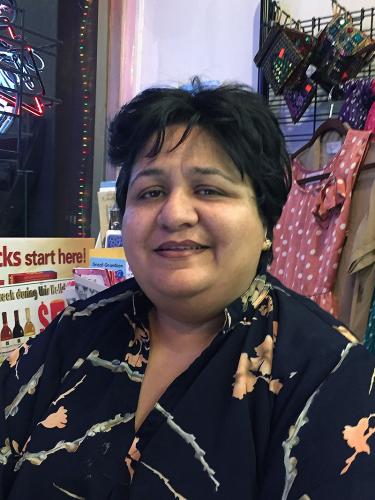A familiar immigrant story: When facing hardship – there is only perseverance
CLARKSVILLE — On the second day of her arranged marriage, Faiza Salman, then 19, asked her new husband, “When is the maid coming to clean the house?”
She laughed as she recalled his response. Ten years her senior, her husband handed her a broom and a dustpan and said, “Darling, you are the maid.”
Salman, a native of Pakistan, had grown up in privilege. Her father was a high-ranking army officer. He had been posted all over Pakistan, all over the world, she said. “My life was full of adventure.”
On Friday, metal shelves were piled in front of the Qwix Mart convenience store in Clarksville, which Salman owns along with her husband, Amir. A posting on Craigslist advertised a store liquidation sale: Racks, shelving, counters, coolers, and more are available.
This won’t be the first time Salman has had to start over.
“When I came here, I’m on the bottom of the barrel,” she said matter-of-factly. She carried on. Now, in her mid-forties now, married for 25 years, she says she has no regrets.
Salman last month received an eviction notice from Paul Van Wie who owns the store she leases.
Stephen Cummins, Van Wie’s lawyer, told The Enterprise that in April he wrote Salman a letter directing her to correct violations in her rental agreement with Van Wie. None of the violations, Cummins said, were corrected and so in June Salman was served with an eviction notice.
The original seven-year lease between Van Wie and Salman expired last year; since then, it has been month-to-month.
Under New York Real Property Law, a month-to-month tenant is charged rent under the terms of the recently-expired lease.
The violations, Cummins said, were:
– Salman was occupying more of the building than she was paying for.
According to Cummins, Salman was paying to use only one-third of the building, but was occupying the whole space. The terms of the expired lease said that Salman was renting 2055 Delaware Turnpike; it said nothing about partial occupancy.
Cummins said that Van Wie had discussed the new partial-occupancy arrangement with Salman. She told The Enterprise that Van Wie did no such thing;
– Salman was chronically late paying her rent.
Salman says that she had never once been late with rent. She said that Van Wie would often not cash her rent checks, which she paid the first of the month, until the end of the month. As an example, she showed The Enterprise a canceled check dated the first of the month that hadn’t been cashed until the 28th.
– Salman was paying her rent with post-dated checks. She disputes this claim as well.
“I have $70,000 worth of inventory plus equipment, another $50,000,” she said. With just a little over a month’s notice to leave, Salman is selling things at a loss.
“A $3,500 machine is going for $300,” she said, offering one example. “Our profit margins are next to nothing … This is all I know how to do. Right now, I’m out of a job.
From abandoned blight to part of the community
“Not even anybody lasted more than four or five months,” Salman said of other businesses that had been located at 2055 Delaware Turnpike before hers. At the time she leased the store, Robert Van Wie, Paul’s father, had been alive and supportive. “An amazing human being,” Salman said of Robert Van Wie, who died in 2015.
In 2010, it took four months to make the store habitable, Salman said. “It was like a dump; my children, my husband, we did everything with our hands. My little one who is in the back,” she said, referring to her daughter, Sanaa, who is now in high school, “she was in third grade or second grade; cleaning and scrubbing the floors.”
Salman said that the building had been vacant before her store opened.
“Robert [Van Wie] felt pride in the store,” Salman said. “First thing in the morning, I would see that man. He supported the business a lot because he wanted everybody else to come here.”
Salman recounted an example of Robert Van Wie’s support, when a cooler broke down: “I said, ‘Bob, my line here, I think, is frozen.’ That 79-year-old man would bring his equipment and fixed it.”
Salman describes Robert Van Wie as “a man who had heart.” On the other hand, she described Paul Van Wie as showing her no respect, “looking in the sky as if he’s something above” on their rare encounters rather than looking at her and talking.
“I would say, ‘Paul, your father was like a dad,” she said. “You are like a brother to me.”
“You know what he said?” Salman asks rhetorically, before answering, “I’m not your brother; I’m your landlord.”
“They’re very good people,” said Edward Reynolds, a frequent customer, of the Salman family. “You know, they got a heart of gold.”
“Look what happened when – you don’t mind me,” said Reynolds, stopping himself mid-sentence, to first ask Salman’s permission to tell a story that would illustrate his point.
She said yes.
“Look what happened when it got broken into, you know, they didn’t go full out and press complete charges against the kids and put them in jail for forever,” he said. The kids had smashed the front window of the Qwix Mart, and made off with some store items.
Reynolds said that the vandals were from a family that had been regular customers, and that they apologized to Salman for what they did.
Salman said that she didn’t press charges because the kids who smashed her window are, like her, part of the community. She said of one of them, “He comes here all the time and he loves me.” Robert Van Wie paid for the new window.
She has dealt with bigotry, Salman said.
When the store first opened, Salman had been outside looking for something in her car when a customer pulled into the parking lot. “Why are you going to help the terrorists?” the passenger said to the driver. “They are not terrorists,” the driver, a regular customer, responded.
Rajinder Narang, a Sikh wearing a turban, stopped by on Friday afternoon for a quick purchase. “This is the only community store,” he said out in the parking lot. “I stop when I have to. They are decent people to deal with,” he said of Salman and her family. “I’m sorry to see them go.”
Being part of the Clarksville community has become deeply important to Salman.
“We kept this store alive; bad or good days, we took it on. Even at midnight on snow days, we don’t close, so the truckers can have coffee,” Salman said. If there’s something a customer needs, she said, and he can’t get to the store she will deliver it — for free.

Empty, but not enough: “I have $70,000 worth of inventory plus equipment, another $50,000,” Faiza Salman told The Enterprise. With just a little over a month’s notice to leave her store, Quix Mart, in Clarksville, Salman is selling things at a loss. “A $3,500 machine is going for $300,” she said.
When Lukoil bought Getty
She knows the worth of serving customers and about keeping a business going.
In 1994, when she arrived in America, Salman’s husband had been the owner of a gas station in Delmar. “The gas station business was good; you make decent money,” she said.
On Wednesday, a long-ago, still-loyal customer, Judy Edic, from the Salmans’ now-closed gas station said she followed them to their new business in Clarksville. She still comes by to shop and chat.
In 2000, Lukoil, a Russian oil conglomerate, bought Getty Petroleum Marketing Inc., a chain of 1,300 gas stations, mostly in the Northeast, one of which was the Salmans.
Salman said when Lukoil took over, it began to change terms.
The company would make stations purchase its gas at market rate and then charge customers the same price, Salman said. It would then provide a nickel in commission for each gallon that had been sold.
Lukoil, according to Salman, tried to raise its tenants’ rent – many of whom were immigrants – threatening to terminate leases if they objected.
“Most immigrants either don’t know their rights or are too scared to stand up for them,” Salman said.
“I stood up,” she said quietly but firmly.
Salman said that she filed a complaint with the Attorney General’s Office against Lukoil for price gouging; Lukoil tried to have Salman evicted, but she had never missed a rent payment.
The two sides eventually reached an agreement, and Salman was able to go back to work.
She said that the company then offered her cash to, in effect, go away.
She stayed put.
Her lawyer, she said, told her to take the money; she disagreed.
If she took the money, she said to her lawyer: “Then that means, if a big guy throws you a bone and you take it and walk away — I’m giving my children a model: When you see something wrong, stand up.”
Salman and her husband owned the gas station in Delmar until 2012, when Lukoil sold it to a Swedish company that soon went bankrupt.
A not-so-humble, but spine-stiffening, start
In Pakistan, a country with about 207 million residents, who have an average income of $1,580, according to the World Bank, Salman’s upbringing was unusual. But, it’s also why the Russians found her a formidable foe.
She grew up with drivers, servants, a cook, cleaning people, and guards. Her home’s five bathrooms were cleaned by maids twice a day, she said. “I couldn’t go out without guards,” she recalled, because her father had been a high-ranking military official.
The oldest of three children, all girls, Salman jokingly referred to herself as her father’s son; he had taught her to hunt.
She said that her parents are very well-educated and open-minded, and that’s how she has chosen to raise her own children, “which has really worked out.”
Salman, like her parents, is Muslim. They were very open about religion, she said; growing up, like her parents, she had gone to Catholic schools.
When her religious education started, her parents handed her the Old Testament and said, “You start from here and then you see how it gets to the Koran.”
Salman said that she used to pray and thank God for giving her the perfect parents. It’s why she wanted them to arrange her marriage. With all of the opportunity they gave her, she told them she wanted an arranged marriage because, “I want to marry the man that you choose for me.” She said her father would make the best decision for her.
Did he make the best decision?
“Yes,” she answered, smiling. “Twenty-five years of marriage.”
Her now-husband was from a good family, she said. He had been in America since 1981, and, not only was he taking care of himself here, he was also taking care of his family back in Pakistan. “A person who takes care of his family will always take care of his wife,” Salman’s father reasoned.
Her father had thought, she said, Amir Salman would be the right man for her because he would give her the freedom to do what she wanted, like her father had. Proving her father right, Salman said, on her second day in America, her new husband showed her how to drive a car.

Impressive, for a couple of reasons: Faiza Salman, third from the right, said that her store, Qwix Mart, in Clarksville, has been closed for an entire day just once in the eight years that she and her husband, Amir Salman, first on the right, have owned it – their son’s graduation from Harvard University. From right to left are Amir Salman, graduate Mujtaba Salman, Faiza Salman, Zainub Amir, Sanaa Amir, and Mahnoor Amir.
Raising them right
“I have to tell you a story,” Salman said.
“His name was Carl,” she said, launching into her narrative. He would come into the Qwix Mart and talk to her son, Mujtaba, for hours about what Carl said were the evils of Islam.
At the same time, Carl would also ask Salman for the manual that she used to raise such terrific children, she said. “I couldn’t tell him it was the Koran.”
After a particularly bad visit, Salman said her very-upset son called her to say he that did not know how much longer he could listen Carl. She said she asked her son, “Mujtaba, what is our religion?” and answered her own question, “Love; patience.”
Then the day came.
“He asked my son, ‘By the way, do you have any religion?’”
Mujtaba told Carl he was Muslim.
“He backed out the store with his jaw on the floor,” Salman said.
The next day, Salman said, an apologetic Carl came into the store and told her, “My hat’s off to the way you raised your children.”
It had taken a lot of manual-writing to get to that point.
Around the time of her showdown with Lukoil, she said, things began to change; until that point, Salman, by her own admission, had been raising “brats.”
Having been shut out from running her business, she began to deliver newspapers to make money. People told her she should could apply for welfare but, she said, “I still have my hands. I can work.”
Mujtaba, 7 years old at the time, would tag along.
One one occasion, after delivering a paper, he asked, “Mommy, what did I make?”
She answered, “13 cents.” He began to cry, she said.
Salman asked if he had been hurt. “He had been hurt a couple times helping with the deliveries,” she said.
No, he was crying, he said, because she had been buying him video games that cost $40 each, and, he had just asked her to buy him a snack and a drink from Stewart’s for $5.
“I will never do this again, Mommy,” Mujtaba said. “I will never ask you for anything again, I will earn it.”
“If I want it, I’ll earn it,” he announced to his mother. Salman said, “From that day till today, the word ‘want’ never came out of my children’s mouths. They’ll ask: Is this a want or a need?”
“Even his schoolwork became better,” his mother said.
Mujtaba went on to finish at the top of his class at Bethlehem Central High School, and then to Harvard University. The day he graduated from college, May 28, 2015, Salman said, was the first, and only, time Qwix Mart was closed for the entire day. Mujtaba is now an investment banker at Citibank.
Zainub, the Salmans’ oldest daughter, had been accepted to Harvard, but chose instead the University at Albany to remain close to her family; she graduated in two-and-half years, her mother said. Zainub now works at Bloomberg, in Manhattan, and comes home nearly every week to help out, her mother said.
Mahnoor, the couple’s third-oldest child, just finished her first year at the University at Albany; she had been accepted to Ivy League schools as well, said her mother. “She chose to stay close to home, to get a job, and help her family,” Salman said.
Sanaa, the couple’s youngest daughter, is still in high school. “She comes before school, and after school; and stays here till midnight. If an order comes, she’ll go and cook,” Salman said.
This is what Paul Van Wie doesn’t understand about her, Salman said. She’s raised four amazing children; she’s gone toe-to-toe with Russian oligarchs – and won; and she, along with her family, built the Qwix Mart from nothing. If she wanted a fight, there’d be a fight. But it comes back to community and family.
“The respect and honor that I give to his parents is beyond anything that he can think of,” she said.
She doesn’t know what she’ll do next.
As she sat at a table in the front of her store, telling her story, she was interrupted.
“Yes, yes, hello? Yes, I should be there in a few minutes,” Salman said to the voice on the other end of the phone. She then apologized for having to end the interview, she had to run; a customer had asked her to pick up his daughter.



The Salman's represent the best of the community. I wish they could have kept their store...it would have been a huge plus for the community.